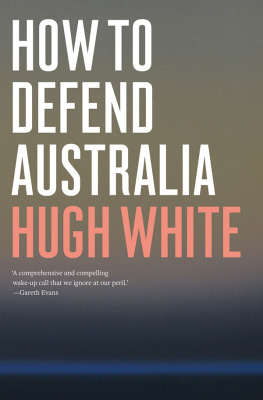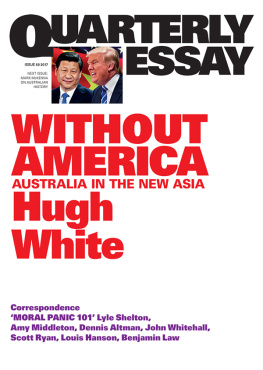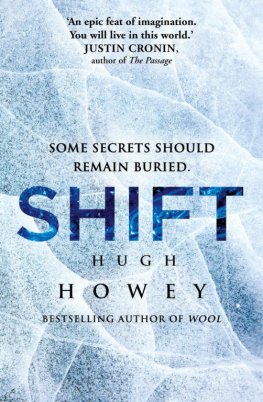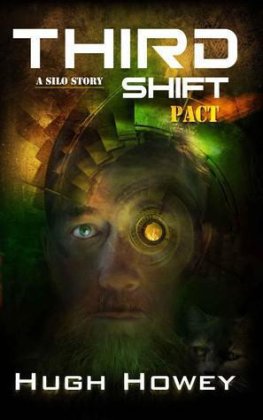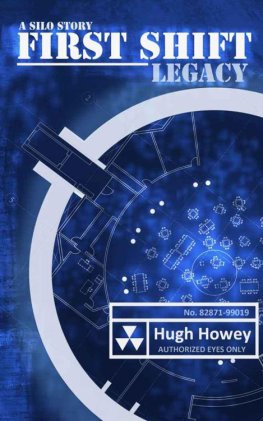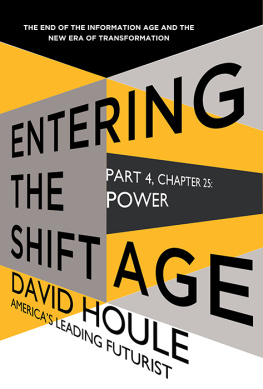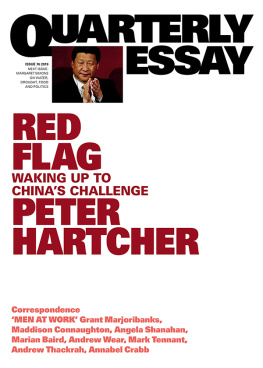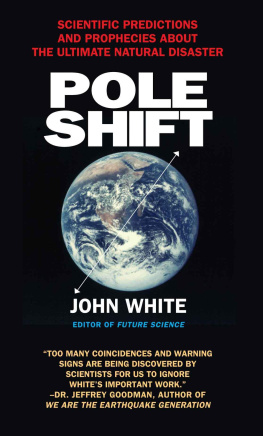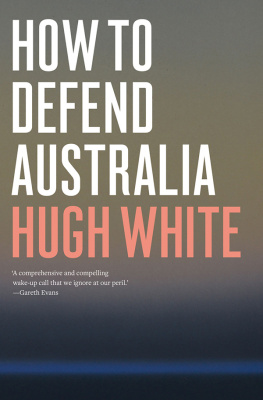Quarterly Essay is published four times a year by Black Inc., an imprint of Schwartz Media Pty Ltd.
Publisher: Morry Schwartz.
ISBN 978-1-86395-488-4 ISSN 1832-0953
A LL R IGHTS R ESERVED.
No part of this publication may be reproduced, stored in a retrieval system, or transmitted in any form by any means electronic, mechanical, photocopying, recording or otherwise without the prior consent of the publishers.
Essay & correspondence retained by the authors.
Subscriptions 1 year (4 issues): $49 within Australia incl. GST. Outside Australia $79. 2 years (8 issues): $95 within Australia incl. GST. Outside Australia $155.
Payment may be made by Mastercard or Visa, or by cheque made out to Schwartz Media. Payment includes postage and handling.
To subscribe, fill out and post the subscription card or form inside this issue, or subscribe online:
www.quarterlyessay.com
subscribe@blackincbooks.com
Phone: 61 3 9486 0288
Correspondence should be addressed to:
The Editor, Quarterly Essay
3739 Langridge Street
Collingwood VIC 3066 Australia
Phone: 61 3 9486 0288 / Fax: 61 3 9486 0244
Email: quarterlyessay@blackincbooks.com
Editor: Chris Feik. Management: Sophy Williams, Caitlin Yates. Publicity: Elisabeth Young. Design: Guy Mirabella. Assistant Editor: Adam Shaw. Typesetting: Duncan Blachford
Printed by Griffin Press, Australia. The paper used to produce this book comes from wood grown in sustainable forests.
Australias Future between
Washington and Beijing
Hugh White
There is a problem with Australias vision of its future. On the one hand, we assume that China will just keep growing indefinitely, buying more and more from our miners at higher and higher prices. On the other hand, we expect America to remain the strongest power in Asia, the regions natural leader and Australias ultimate protector. We will have a very nice future if both these things happen. The problem is that they cannot both happen at once. If China grows fast enough to keep our economy buoyant, it will overtake America to become the richest country in the world sometime around 2030. That will make it too strong to live under American leadership in Asia. It will look to lead in its own right, and challenge Americas position.
Asia will be transformed by what follows, and so will Australia. For forty years Americas dominant place in Asia has been essentially uncontested by China and the regions other strong states. That has kept Asia remarkably peaceful and made Australia very secure. Chinas growing wealth and power, by contesting Americas leadership, upsets all this. A new order will appear in Asia, which may not be as peaceful and stable as the one that has served us so well for over a generation. Australia will find itself in a different and perhaps more dangerous region, facing higher risks of conflict and fewer economic opportunities. We could easily end up both poorer and less secure than we are today.
The foundations of Asias political and strategic order are already shifting. This year China overtook Japan to become the worlds second-biggest economy. It is already bigger, relative to the US, than the Soviet Union ever was during the Cold War. A Chinese challenge to American power in Asia is no longer a future possibility but a current reality. Few issues are more important to Australias future than how this plays out. You would not know it to listen to our leaders. Even Kevin Rudd, who understands Asias dynamics as well as anyone, avoided the issue as prime minister, worried that it might make voters uneasy. Tony Abbott dismissed the whole question when he wrote in his book Battlelines that by 2020, The United States will still have the worlds strongest economy by far and Chinas rise may not mean much change for Australias international relationships or foreign policy priorities. Julia Gillard seems never to have thought about it at all.
Our leaders, and by extension the rest of us, are assuming that Asia will be transformed economically over the next few decades, but remain unchanged strategically and politically. It is an appealing assumption because the past forty years have been among the best times in Australias history, and it has been easy to believe that American power would continue indefinitely to keep Asia peaceful and Australia safe. That has been a cardinal mistake. To see why, we need to know what made the last few decades so good.

For one hundred years roughly from 1870 to 1970 Asia was convulsed by the power politics of strong states. Russia, Britain, France, Germany, Japan and America all jostled for markets and political influence. This made them strategic competitors and led to many big wars, culminating in the Pacific War that ended at Hiroshima and Nagasaki. After 1945 the power politics continued, as Asia became a theatre of the Cold War. Then, in the early 1970s, the power politics virtually stopped. Since then, relations among Asias strongest states have been remarkably harmonious. Armed force has played little or no role; fear of one another has not driven their defence planning. They have not tried to attract client states and build spheres of influence against one another, nor have they set out to subvert one anothers internal politics or nobble one anothers economies. Above all, they have kept the peace. Aside from a few minor skirmishes, no major Asian power has been involved in substantial military operations in East Asia since China taught Vietnam a lesson in 1979. It is probably the longest period of peace in Asias long history, and certainly a big change from the previous century.
Why did this happen? One argument is that closer economic integration has fundamentally transformed the way countries relate to one another. In a globalised world, trade, investment and other forms of interaction are so important that governments cannot afford to disrupt them, so old-style power politics has disappeared because it doesnt pay. This may be part of the explanation, but it cannot be the whole story, and it is probably not the most important part. Asias stable order has been as much a cause as a result of economic integration and growth, because the great powers had to stop competing strategically before Asias economic integration could get going. So what started the virtuous cycle of stability and growth in the first place?
No one expected that things would work out so well when Asias era of peace began almost forty years ago. The late 1960s and early 1970s was a time of great uncertainty. China was seen as a rising power, Japan chafed at the constraints of its post-war settlement, the Soviets were looking elsewhere, India loomed unpredictably, and America seemed weakened and demoralised by failure in Vietnam. It seemed that Asia was headed for an even more dangerous era than the preceding few decades, with a new, more equal, more fluid and more unstable balance of power among all these strong states.
But that did not happen. Instead, America emerged from failure in Vietnam stronger in Asia than ever, because for the first time its position became uncontested by Asias two next-strongest countries, Japan and China. This was not just an accident of history, but the result of a remarkable piece of strategic diplomacy by two of the most ambiguous characters in recent history: Richard Nixon and Henry Kissinger. Nixon, advised by Kissinger, went to Beijing in 1972 and cut a deal with Mao. America would stop pretending that the nationalist regime in Taiwan was the government of China and recognise instead the communist government in Beijing. In return, China would stop contesting Americas position in Asia and stop supporting communist insurgencies around the region.



